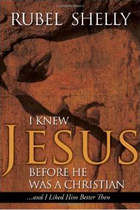
And I Liked Him Better Then
by Rubel Shelly
A Review
There's something really off-putting to me about the title of this book. I've never heard Jesus referred to as a "Christian" anywhere until it became trendy over the past decade for some Christian leaders and authors to disown the name "Christian" because of church people behaving badly. Paul knew that some behaved badly in the name of Christ, but he was not ashamed to be referred to as a "Christian" when he was on trial before Agrippa in Acts 26:28-29.
Amazingly, on page 18 Shelly writes, "Even so, Jesus is the original Christian." (Now I'm confused, did Shelly like Jesus before He was the original Christian?) Webster's dictionary says "Christian" as a noun means "one who professes a belief in the teachings of Jesus Christ." So now we put the author of our faith in the same category as His followers? Which church would Jesus join today, the one that would try to talk Him into being a Christian, or out of being one? I don't think he would "join" any church because He died so that we could join him.
Also, this claim in the title that the author "knew" Jesus before he was a "Christian". That would make the author really really old, wouldn't it? But what it really means is that the author knows about Jesus from reading the Gospels. Well, so do I as do millions of others.
You may be interested to know that much of the content (some even word-for-word) of the book exists on-line and for free as a series of sermons that Rubel Shelly delivered back in 2005. If you know Internet basics, I may have just saved you a ten dollar bill.
Now to the actual content of the book.
First of all, there is nothing in this book that was not very familiar territory to me before I read it. This is a what's-wrong-with-the-church-and-how-to-fix-it book. This subject was dealt with far more incisively, in my opinion, by books such as The Open Church by James H. Rutz in 1992 or Unbroken Bread by Mike Root in 1997. (These books, however, were written back in the 1990's before it was discovered that "Modernity" was the source of all the Church's current problems, so they are no doubt irrelevant now. Whatever you do, don't read them.) And, there has been torrent of such books since these were written.
Speaking of "Modernity", On page 36, Shelly writes about the "Church of Modernity". Shelly writes "Over the past five hundred years, a particular form of institutional church that has functioned variously as a club, nation state, forensic society, and irrelevance has obscured the presence and activity of God."
Here we go again. "Modernity" has made the church "irrelevant". A meme that first took over among the bookish, goatee wearing twenty-something beta-males is now conventional wisdom. It sure is a great excuse to not study history or to appreciate those who came before us, or to experience a bit of humility. History is starting over with us! We are the ones we've been waiting for!
Is it possible that the church changed because the first printed bible became available about 550 years ago? And, were things really so great over 500 years ago when the Church was more like an empire and had an army and the vast majority of Christians didn't even have direct access to God's Word?
Here are a few more points that Shelly made that I feel compelled to comment on.
On page 53, Shelly writes, "Christians have somehow come to be observers and consumers of religion rather than sold-out and surrendered imitators of Jesus of Nazareth."
It's funny that the first time I heard a Christian talk about burning down churches was in a Church of Christ back in the 1980's. It was OK for this person to say that because he was a guest speaker from the world of academia. I'm sure it would not be OK if one of the rank-and-file sheep had said the exact same thing. We've become consumers because that's what most church leaders really seem to want. If anyone really becomes engaged in Christianity it is likely that they will soon develop opinions differing from the church leadership, and then they will either eventually either just shut up and conform (but with little enthusiasm) or speak out and be kicked out.
Now, here's where I'll commend Shelly. On page 106 Shelly deals with something that I and many others have had first-hand experience with, and that's this tendency toward fatalism among Christians when dealing with tragedy. "God gives children with special needs only to very special mothers who can give them what they need" is an example of this. Or the general version, "You're in over your head and suffering in life because God put you there as part of a plan." I'm glad Shelly took a swipe at that mentality.
But that nowhere near makes up for the tendency to want to fit in with the trendy "emergent" church mentality that smears most all of pre-postmodern Christendom with the broad strokes of disparaging stereotypes.
Then there's page 151, where Shelly writes, "We became so arrogant in social and political life and European-American white males so dictated life in general that racism, sexism, ethnocentrism, and other forms of might-makes-right idolatry were threatening to destroy the world. The very scientific establishment that made the means to it now told us that we were only seconds to minutes away from the midnight of nuclear self-destruction."
Wow, here's a Christian so Christian that he likes Jesus before He was a Christian ranting like an indoctrinated leftist agitator and blaming all the evils of the past several centuries on white males. That's racist and sexist too, by the way. All those evils were alive and well long before those white males dictated life for everyone, and if there were no white males, they would still be alive and well. It's called human nature.
The chapter "Jesus Could use a Good PR Agent" disappointed me the most. Here Shelly -- by quoting someone else -- dredges up the Hutaree Militia and the "Vatican fiasco" and Pat Robertson and wonders why Jesus gets such bad PR. Well, here's a thought: perhaps Jesus gets such bad PR because the media gatekeepers make sure that everyone knows when someone claiming to be a Christian does something loony or terrible. Christians doing good is not news. Christians on the receiving end of evil isn't much news either. Back on December 13th 2008 someone set fire to Sarah Palin's church with people inside it. How many people can recall that?
Shelly also seems to be rather sloppy with Scripture at times. On page 146 he quotes Paul's epistle to Philemon. Shelly writes, "Somehow, in the course of their many conversations, it dawned on Paul that he knew Onesimus' former owner-master!" Or, could it be that after arriving in Rome (bad place to be a runaway slave) Onesimus purposefully sought out Paul for help and landed in prison? Onesimus would most likely have already known who Paul was. And when Shelly writes, "Thus Paul faced the challenge of encouraging Onesimus to return property and money he had stolen from Philemon..." But it doesn't say in the letter that Philemon had stolen anything; Paul simply wrote "If he has done you any wrong or owes you anything, charge it to me".
On page 108 Shelly writes, "Jonah ran from God because he was a bigot and a racist, but God still pursued him." All it says in the book of Jonah is that he ran away from God. It doesn't say why explicitely. But then, all the "cool" postmodern Christians know that the "Modern" church is full of bigots and racists, so we know what Jonah was anyway, right?
Then there's this jewel on page 116 where Shelly is discussing the word "worship": "Biblical writers use the word just as we do to signify time and places, rituals and ceremonies." Nothing could be further from the truth for Christians. No meeting of Christians in the New Testament is ever referred to as "worship". There are no explicitly stated times, days or places to meet. (You know, I read about Christianity before it was a ritualistic ceremony, and I think I would have liked it better then.)
In summary, "Modern" church is bad. Jesus has a bad name because of bad Christians. Nothing good happened in the Church between 300 AD and the end of "Modernity" (which I'll put at the year 2000). We need to do church differently, and there's at least two pages (p161-162) describing how a particular church is starting to do things sort of differently. Now, go do likewise.
Actually, Shelly meant by the book's title that "I knew Jesus Before he was a (post-Constantine, big-shot, uppity, privileged, hypercritical, disparaging, dismissive) Christian" (page 197). Well, Jesus never became those things, but I feel like I just read a book by an author who has.

 RSS Feed
RSS Feed
